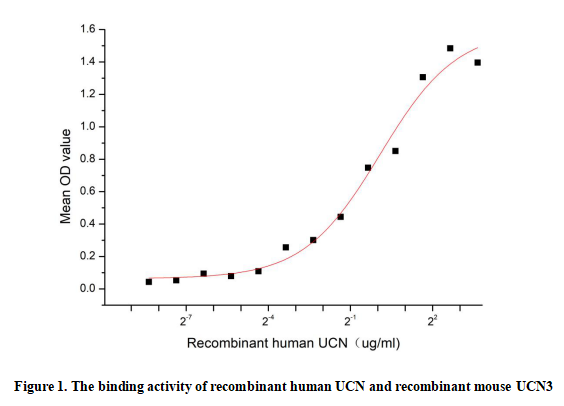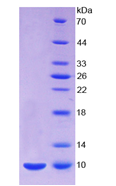Active Urocortin (UCN) 

UI; UROC; Urocortin 1; UCN1
- UOM
- FOB US$ 220.00 US$ 550.00 US$ 1,100.00 US$ 3,300.00 US$ 8,250.00
- Quantity
Overview
Properties
- Product No.APA231Hu01
- Organism SpeciesHomo sapiens (Human) Same name, Different species.
- ApplicationsCell culture; Activity Assays.
Research use only - DownloadInstruction Manual
- CategoryEndocrinology
- Buffer FormulationPBS, pH7.4, containing 0.01% SKL, 5% Trehalose.
- Traits Freeze-dried powder, Purity > 90%
- Isoelectric Point11.7
Sign into your account
Share a new citation as an author
Upload your experimental result
Review

Contact us
Please fill in the blank.
Activity test

Urocortin (UCN) is a 40 amino acid peptide hormone that belongs to the corticotropin-releasing factor (CRF) family. It is expressed in specific regions of the brain but is also detectable in other organs notably the heart.UCN is involved in stress response and has diverse physiological functions including modulation of immune and inflammatory responses, as well as effects on the cardiovascular and central nervous systems.Besides,Urocortin 3 (UCN3) has been identified as an interactor of UCN, thus a functional binding ELISA assay was conducted to detect the interaction of recombinant human UCN and recombinant mouse UCN3. Briefly, biotin-linked UCN were diluted serially in PBS, with 0.01% BSA (pH 7.4). Duplicate samples of 100μl were then transferred to UCN3-coated microtiter wells and incubated for 1h at 37℃. Wells were washed with PBST 3 times and incubation with Streptavidin-HRP for 30min, then wells were aspirated and washed 5 times. With the addition of substrate solution, wells were incubated 15-25 minutes at 37℃. Finally, add 50µl stop solution to the wells and read at 450nm immediately. The binding activity of recombinant human UCN and recombinant mouse UCN3 was shown in Figure 1, the EC50 for this effect is 1.06ug/mL.
Usage
Reconstitute in 10mM PBS (pH7.4) to a concentration of 0.1-1.0 mg/mL. Do not vortex.
Storage
Avoid repeated freeze/thaw cycles. Store at 2-8°C for one month. Aliquot and store at -80°C for 12 months.
Stability
The thermal stability is described by the loss rate. The loss rate was determined by accelerated thermal degradation test, that is, incubate the protein at 37°C for 48h, and no obvious degradation and precipitation were observed. The loss rate is less than 5% within the expiration date under appropriate storage condition.
Increment services
-
 BCA Protein Quantification Kit
BCA Protein Quantification Kit
-
 Molecular Mass Marker for Protein
Molecular Mass Marker for Protein
-
 Monoclonal Antibody Customized Service
Monoclonal Antibody Customized Service
-
 Polyclonal Antibody Customized Service
Polyclonal Antibody Customized Service
-
 Protein Activity Test Experiment Service
Protein Activity Test Experiment Service
-
 Electrophoretic Mobility Shift Assay (EMSA) Experiment Service
Electrophoretic Mobility Shift Assay (EMSA) Experiment Service
-
 Buffer
Buffer
-
 Lentivirus Packaging Experiment Service
Lentivirus Packaging Experiment Service
-
 Adenovirus Packaging Experiment Service
Adenovirus Packaging Experiment Service
-
 Real Time PCR Experimental Service
Real Time PCR Experimental Service
-
 Spike RBD Protein (S-RBD)
Spike RBD Protein (S-RBD)
-
 Protein G
Protein G
-
 Protein A
Protein A
Citations
- P-205 Basement membrane integrity is altered in the late secretary phase in women with endometriosis: implications for the pathogenesis of endometriosis OxfordJournals: source
- Vasoprotective effects of urocortin 1 against atherosclerosis in vitro and in vivoPubmed:25462164
- Novel markers in the diagnostics of endometriomas: Urocortin, ghrelin, and leptin or leukocytes, fibrinogen, and CA-125?PubMed: 25951715
- Anti-Inflammatory and Pro-Inflammatory Neuropeptides in Dilative Cardiomyopathy are there Relations to Psychophysical Stress?
- Erasing m6A-dependent transcription signature of stress-sensitive genes triggers antidepressant actions34527794







